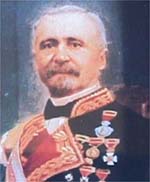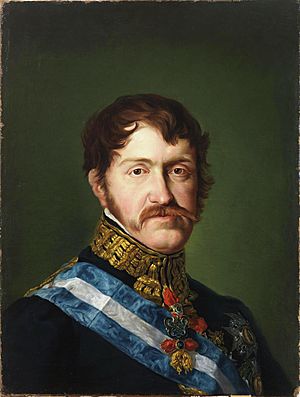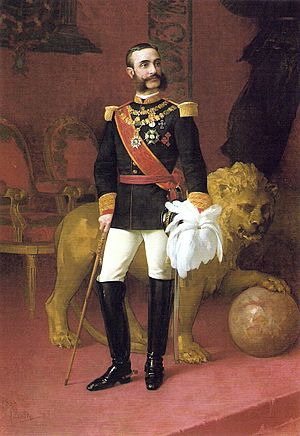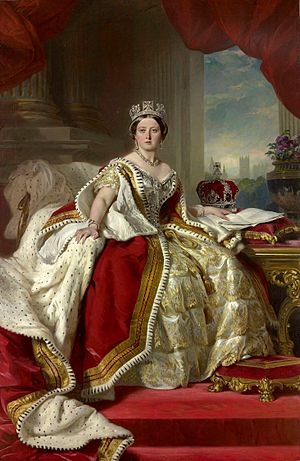Francisco de Ceballos y Vargas facts for kids
Quick facts for kids
Francisco de Ceballos y Vargas
|
|
|---|---|
 |
|
| Minister of War of Spain | |
| In office December 21, 1875 – March 7, 1879 |
|
| Monarch | Alfonso XII |
| Prime Minister | Antonio Cánovas del Castillo |
| Preceded by | Joaquín Jovellar |
| Succeeded by | Arsenio Martínez Campos |
| Captain General of Catalonia | |
| In office 1873–1874 |
|
| Prime Minister | Emilio Castelar |
| Preceded by | Arsenio Martínez Campos |
| Succeeded by | Segundo de la Portilla Gutiérrez |
| Captain General of Cuba | |
| In office July 11, 1872 – April 18, 1873 |
|
| Prime Minister | Manuel Ruiz Zorrilla |
| Preceded by | Blas Villate |
| Succeeded by | Cándido Pieltaín |
| Personal details | |
| Born | October 9, 1814 Torrelavega, Cantabria, Spain |
| Died | March 9, 1883 (aged 68) Madrid, Community of Madrid, Spain |
| Military service | |
| Allegiance | |
| Branch | |
| Years of service | 1833 — 1883 |
| Rank | Lieutenant General |
| Battles/wars | First Carlist War Hispano-Moroccan War Ten Years' War Cantonal Revolution |
Francisco de Paula de Ceballos y Vargas was an important Spanish military leader. He became a Lieutenant General, which is a very high rank in the army. He also served as a "Captain General" in different parts of the Spanish Empire, like Catalonia and Cuba.
He was also a "Senator for life," meaning he was a member of the Spanish Senate for his entire life. He represented the region of Santander Province.
Throughout his long military career, he fought in several important wars. These included the First Carlist War and the Hispano-Moroccan War. He also played a role in the Spanish Glorious Revolution. This revolution changed Spain's government.
Francisco de Ceballos served under different types of government in Spain. He worked for Queens Isabella II and Alfonso XII. He also served during the time of the First Spanish Republic. Later, he became the Minister of War under King Alfonso XII. He was also a member of the Conservative Party.
Contents
Who Was Francisco de Ceballos?
Early Life and Military Start
Francisco de Ceballos y Vargas was born on October 9, 1814. His hometown was Torrelavega, in the region of Cantabria, Spain. His father was a lawyer, but Francisco chose a different path.
At just 19 years old, in 1833, he joined the military. He became part of the King's personal guard, called the "Guardia de Corps." Soon after, King Fernando VII died. This led to a big conflict in Spain.
Fighting in the First Carlist War

After King Fernando VII died, his brother, Carlos María Isidro, wanted to be king. But Fernando's daughter, Isabel II, was supposed to be the next queen. This disagreement started the First Carlist War.
Francisco de Ceballos supported Queen Isabel II. He fought against Carlos María Isidro's supporters, known as the Carlists. The war was very intense, especially in the Basque Country.
He took part in many battles in the northern part of Spain. In 1836, he fought in his first big military action. He was even wounded during a battle in Castrejana. He also fought in important sieges, like the one in Zaragoza.
By the end of the war, Francisco de Ceballos had risen in rank. He became a lieutenant colonel. He also received a special award called the "Laureate Cross of Saint Ferdinand." This award is given for bravery in battle.
Serving in Cuba
In 1845, Francisco de Ceballos traveled to Cuba. At that time, Cuba was a Spanish colony. He worked there in both military and political roles. He became a "deputy governor" in cities like Cienfuegos and Santa Clara.
As deputy governor, he helped organize the government in Cuba. He also cared about public welfare. For example, he helped start a hospital called the Hospital de la Caridad in Cienfuegos.
While in Cuba, he helped Spain in many ways. He stopped an attempt by General Narciso López to make Cuba independent. He also helped save a British ship called the Winlon from sinking. For this, he received a special gold medal from Britain.
Back in Spain: Wars and Politics
Francisco de Ceballos returned to Spain in 1859. He was now a Colonel. He joined the Army of Africa and fought in the Hispano-Moroccan War. He participated in several key battles during this war. After the war, he was promoted to Brigadier General.
Stopping Rebellions
In 1866, he helped stop a rebellion in Madrid. This was called the "San Gil Barracks Uprising." It was a mutiny against Queen Isabella II. Francisco de Ceballos was brave during this event. He even lost his horse and was shot several times. The Queen promoted him to Field Marshal for his actions.
Later, during the Glorious Revolution, he helped put down another uprising. This time, it was a republican rebellion in Andalusia. For his success, he received the "Great Red Cross of Military Merit."
In 1873, Spain became the First Spanish Republic. The new government asked him to help reorganize the army. He was also sent back to Cuba as the Captain General of Cuba. He held this important position for about a year.
After returning to Spain, he helped during the "Cantonal Revolution." This was a time when some cities in Spain declared themselves independent. He was promoted to Lieutenant General for his service during this time.
Becoming a Minister and Senator
On December 21, 1875, Francisco de Ceballos became the Minister of War. This meant he was in charge of the entire Spanish army. He held this important job for over three years. One of his big achievements was signing the Constitution of 1876.

In 1876, he traveled with King Alfonso XII to visit hospitals. These hospitals cared for soldiers wounded in the civil war. The King also visited Francisco's hometown of Torrelavega.
Francisco de Ceballos also became a "Senator for life." This was a special honor. It meant he was a member of the Spanish Senate for the rest of his life. Later that year, the King gave him the title of "Marquis of Torrelavega." This was another high honor.
He also served as the Chief of the King's Military Quarter. This was a personal role helping the King. Francisco de Ceballos loved his family's ancestral town of Cohicillos. He also paid to restore a very old church there that was almost destroyed.
Francisco de Ceballos died on March 9, 1883, at 68 years old. His son, Pablo de Ceballos y Avilés, inherited his title as Marquis.
Awards and Honors
Francisco de Ceballos received many awards for his bravery and service.
Awards from Spain
- Laureate Cross of Saint Ferdinand, 1st Class (1838 and 1844) - Awarded for great bravery in battle.
- Order of Isabella the Catholic, Cross (1840) and Grand Cross (1865) - A Spanish civil order of merit.
- Royal and Military Order of Saint Hermenegild, Cross (1854) and Grand Cross (1866) - An award for military service.
- Cross of Military Merit (1855) and Grand Cross with red insignia (1869) - Another military award for distinguished service.
- Order of Charles III, Commander (1864) - A Spanish order of chivalry.
International Awards

 Italy: Order of Saints Maurice and Lazarus, Knight of the Grand Cross - An Italian order of merit.
Italy: Order of Saints Maurice and Lazarus, Knight of the Grand Cross - An Italian order of merit. Tunis: Grand Cross of Nirhan Yfhijar - An award from Tunisia.
Tunis: Grand Cross of Nirhan Yfhijar - An award from Tunisia. United Kingdom: Great Gold Medal of Great Britain (1858) - Awarded by the United Kingdom for saving a British ship.
United Kingdom: Great Gold Medal of Great Britain (1858) - Awarded by the United Kingdom for saving a British ship.
See also
 In Spanish: Francisco de Ceballos para niños
In Spanish: Francisco de Ceballos para niños
 | Isaac Myers |
 | D. Hamilton Jackson |
 | A. Philip Randolph |

